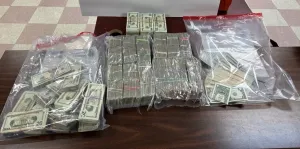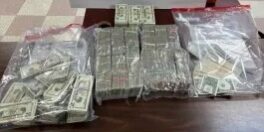CBP Seizes $184K at Texas Border
What You Need to Know About CBP Money Seizures

Photo courtesy of U.S. Customs and Border Protection.
If you are currently facing a CBP money seizure as outlined in the press release below, don’t hesitate to contact San Diego Defenders – Forfeiture Law Firm at (619) 258-8888 for a free, confidential consultation.
On May 2, 2025, U.S. Customs and Border Protection (CBP) officers seized $184,095 in unreported U.S. currency from two Mexican citizens during an outbound inspection at the Brownsville and Matamoros International Bridge in Texas.
According to CBP:
The seizure took place on May 2, when CBP officers working at the Brownsville and Matamoros International Bridge encountered a 32-year-old male Mexican citizen driving a 2022 Fiat, and a 33-year-old female Mexican citizen as a passenger in the same vehicle who were selected for a routine outbound inspection. In secondary, CBP officers discovered packages containing bulk U.S. currency totaling $148,610 hidden within the vehicle. CBP officers also discovered $5,485 on the driver and $30,000 concealed on the body of the female passenger.
The vehicle and the cash were seized, and Homeland Security Investigations (HSI) further investigated the two individuals involved.
This instance is one of many that demonstrate the serious consequences of failing to declare U.S. currency per the reporting requirements when entering or leaving the country.
While it is not illegal to travel with any sum of cash, Federal law (31 USC § 5316) requires that any traveler transporting more than $10,000 in currency or monetary instruments internationally must declare the amount to CBP by completing a FinCEN Form 105.
Failure to report, either intentionally or due to an innocent lack of awareness, can result in immediate seizure of the funds and possible criminal charges.
CBP money seizures often occur because travelers are unaware of the reporting requirements or misunderstand the process.
In some cases, travelers may divide large amounts of money among multiple people or in different bags to avoid suspicion. When performed to evade the reporting requirements with amounts of cash over $10,000, this constitutes “cash structuring” under 31 USC § 5324.
Others may conceal the money in vehicles, luggage, or on their person, which is referred to as “bulk cash smuggling” under 31 USC § 5332(a)(2).
Regardless of the traveler’s intent, CBP treats these situations seriously and has the authority to seize the currency and initiate the forfeiture process, which can be done sometimes even without criminal charges.
If you are experiencing a CBP money seizure, time is critical. The first step is to respond promptly to any Notice of Seizure letter, since there is a limited number of days to contest forfeiture.
It is essential to consult with an attorney who is experienced in handling CBP money seizures and federal asset forfeiture cases. Attorney Dan Smith at San Diego Defenders – Forfeiture Law Firm, with 35 years of experience in federal defense, can evaluate your case, help prepare your documents for the return of property, and ensure that all deadlines are met.
Call San Diego Defenders – Forfeiture Law Firm at (619) 258-8888 for a free, confidential consultation.
Se habla Español.
We offer payment plans and contingency fees, where we do not get paid until you win.
See our recent results here!
Our firm handles asset forfeiture cases for any property nationwide.







